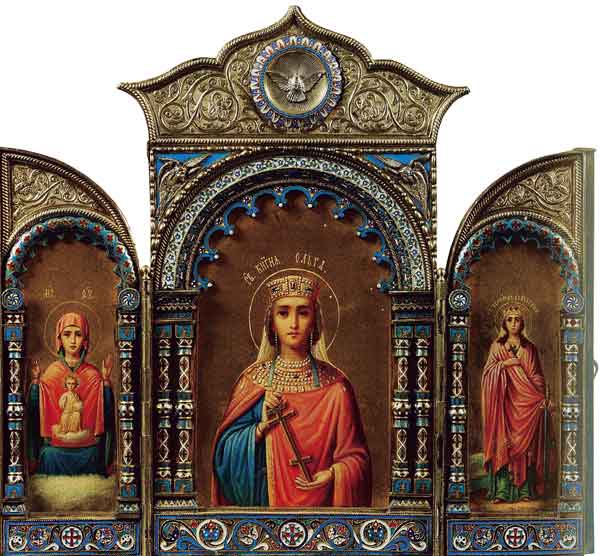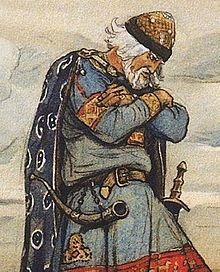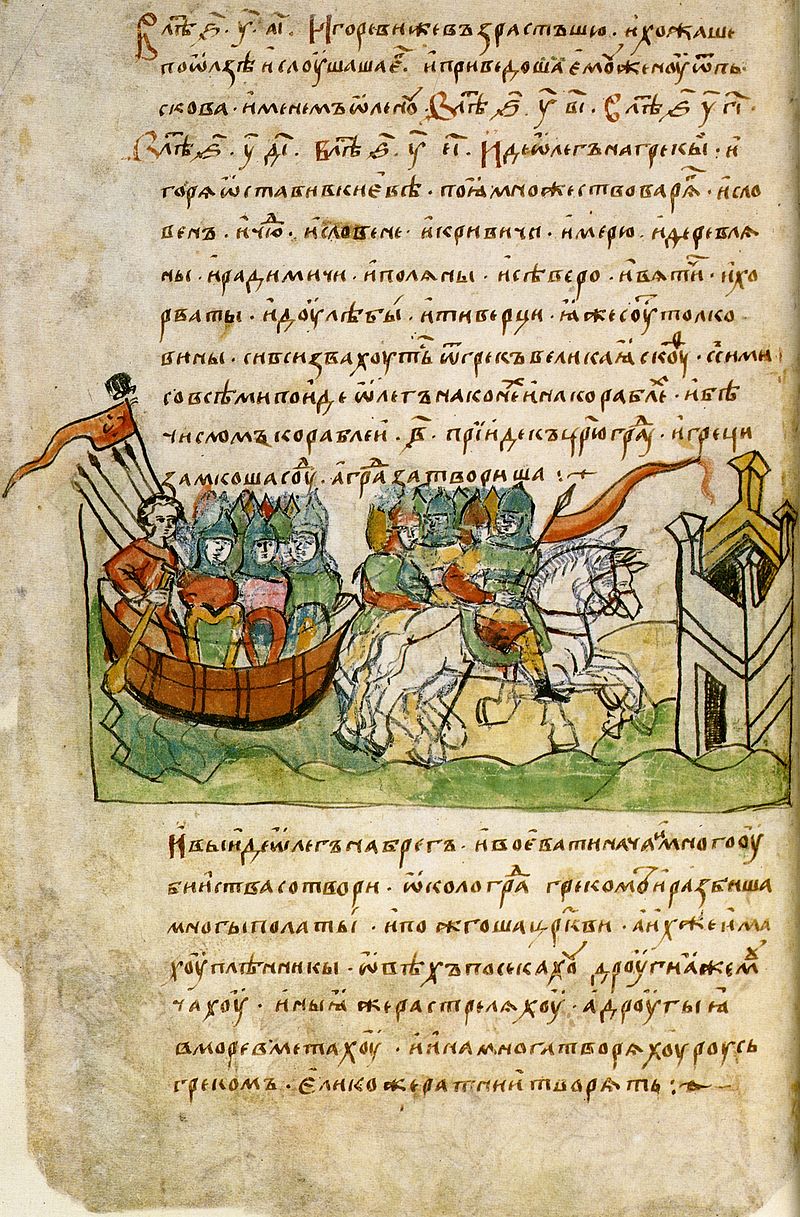A place to learn
Olga of Kiev and the Kievan Rus’
Olga of Kiev was the first recorded female ruler in Russia. She led her family to convert to Christianity and later became a saint. Before she became a saint she was, perhaps, one of the deadliest and most vengeful women in recorded history. To fully understand her evolution it’s important to understand the history leading to her ascension to the throne, and eventual sainthood. This is the story of the origins of the Kievan Rus’ and Olga of Kiev. This article is based on the historical text the “Primary Chronicle”. An open source version can be found at the conclusion of the article.
Update: We’ve also made a podcast based on this article. Check it out on Itunes or Youtube
Oleg of Novgorod and the Beginning of the Kievan Rus’
It all began in the Kievan Rus’ (The land of Rus’) in about 882 CE. The Kievan Rus’ was a loose confederation of Slavic tribes with complex-often competing-ties with each other. Kievan Rus’ began as a principality that would, at its pinnacle, stretch from the Black Sea to the Baltic sea. Modern day Russia, Ukraine and Belarus all originated from the Kievan Rus’. Oleg of Novgorod is attributed the unification of tribes and territory comprising the Kievan Rus’. His story, as well as the history of the Eastern Slavs as a people was recorded in the “Primary Chronicle.” According to the “Primary Chronicle” Oleg was entrusted to rule the tribe of Chieftan Rurik. Oleg was also instructed to keep a close eye on Rurik’s son, Igor, who would later replace Oleg as the ruler of the Kievan Rus’.
Oleg was a shrewd and cunning ruler. He used trickery and violence to secure cities and territories ultimately uniting them and naming Kiev as the new capital of his territory. After securing his kingdom he led a raid on the city of Constantinople in 907CE. This led to a series of treaties that benefited both societies. The “Primary Chronicle” notes that Oleg was known to be a prophet. Legend claims that during hostilities with the Byzantine’s he was offered a cup of wine laced with poison. Using his prophetic powers he was able to discern the vile contents within and escaped the grip of death.
The legend of his prophetic nature carried on until his death. A pagan priest had prophesied that along with Oleg’s stallion’s death Oleg would also die. Fearing the prophecy Oleg sent his stallion away to a distant part of the kingdom. After the passage of many years he asked to know the fate of his stallion. He was told that it had died and Oleg rushed off to view its bones. Upon inspecting the skull of the dead animal a snake slithered out from under the skull and bit him in the foot. He was mortally wounded by the snake and died. The people of his kingdom mourned his death and buried him in a hill called Schekovitsa.
Igor of Kiev
After the death of Oleg, Igor ascended to the throne. By this time Igor had been fighting alongside his protector and king for years. Igor reigned as king for nearly thirty years continuing on the violent tactics of Oleg. In 941 and 944 CE he sacked Constantinople again (and again). These attacks led to half of his fleet being burned by the Greeks in a harrowing naval battle.
Excerpt from the “Primary Chronicle” on the naval battle and aftermath
The “Primary Chronicle” reads as follows:
“They waged war along the Pontus
as far as Heraclea and Paphlagonia, and laid waste the entire region
of Nicomedia, burning everything along the gulf. Of the people they
captured, some they butchered, others they set up as targets and shot at,
some they seized upon, and after binding their hands behind their
backs, they drove iron nails through their heads. Many sacred churches
they gave to the flames, while they burned many monasteries and vil-
lages, and took no little booty on both sides of the sea. Then, when the
army came out of the east, Pantherius the Domestic with forty thous-
and men, Phocas the Patrician with the Macedonians, and Theodore
the General with the Thracians, supported by other illustrious nobles,
surrounded the Russes. After taking counsel, the latter threw them-
selves upon the Greeks, and as the conflict between them was desperate,
the Greeks experienced difficulty in winning the upper hand. The
Russes returned at evening to their companions, embarked at night
upon their vessels, and fled away. Theophanes pursued them in boats
with Greek fire, and dropped it through pipes upon the Russian ships,
so that a strange miracle was offered to view.
Upon seeing the flames, the Russians cast themselves into the sea-
water, being anxious to escape, (45), but the survivors returned home.
When they came once more to their native land, where each one re-
counted to his kinsfolk the course of events and described the fire
launched from the ships, they related that the Greeks had in their
possession the lightning from heaven, and had set them on fire by
pouring it forth, so that the Russes could not conquer them. Upon
his return, Igor’ began to collect a great army, and sent many mes-
sengers after the Varangians beyond the sea, inviting them to attack
die Greeks, for he desired to make war upon them.”
The conflict eventually ultimately forced a treaty with Constantine VII. The treaty was favorable for the Kiev Rus’ and peace was once again restored for a short time. It was after the conflict with Constantinople that Igor made a fatal mistake. His predecessor Oleg had received tribute from the Drevilians up until his death(883-912 CE). After his death they stopped paying tribute, for decades. In 942 CE Igor tried to regain their tribute. He was able to receive a small tribute from the Drevilian’s but on his journey homeward he decided the tribute was not enough. He returned with a small envoy seeking more tribute. upon hearing of his return the Drevilians concocted a plot to assassinate Igor. His death was later chronicled by the historian Leo the Deacon. Leo the Deacon writes, “They had bent down two birch trees to the prince’s feet and tied them to his legs; then they let the trees straighten again, thus tearing the prince’s body apart.” A gruesome end for a king.
The Death of Igor According to the “Primary Chronicle”
The “Primary Chronicle” recroded Igor’s fatal mistake in the following excerpt:
“The envoys then returned to the Emperor, and reported all the
words of Igor’ and his affection for the Greeks. Thus Igor’ began to
rule in Kiev, enjoying peaceful relations with all nations. But when
autumn came, he thought of the Derevlians, and wished to collect from
them a still larger tribute. 54
6453 (945) . In this year, Igor’s retinue said to him, “The servants of
Sveinald are adorned with weapons and fine raiment, but we are naked.
Go forth with us, oh Prince, after tribute, that both you and we may
profit thereby.” Igor’ heeded their words, and he attacked Dereva in
search of tribute. He sought to increase the previous tribute and col-
lected it by violence from the people with the assistance of his followers.
After thus gathering the tribute, he returned to his city. On his home-
ward way, he said to his followers, after some reflection, “Go forward
with the tribute. I shall turn back, and rejoin you later.” He dismissed
his retainers on their journey homeward, but being desirous of still
greater booty he returned on his tracks with a few of his followers.
The Derevlians heard that he was again approaching, and consulted
with Mai, their prince, saying, (55) “If a wolf come among the sheep,
he will take away the whole flock one by one, unless he be killed. If
we do not thus kill him now, he will destroy us all.” They then sent
forward to Igor’ inquiring why he had returned, since he had collected
all the tribute. But Igor’ did not heed them, and the Derevlians came
forth from the city of Iskorosten’ and slew Igor’ and his company, for
the number of the latter was few. So Igor’ was buried, and his tomb is
near the city of Iskorosten’ in Dereva even to this day.”
Olga of Kiev

Little is known of her life before being married to Igor of Kiev. Scholars place her birth around 903 CE, but no records exist to confirm this. The first mentioning of Olga in the “Primary Chronicle” states that she was “brought to him from Pskov.” She isn’t mentioned again until the death of Igor. After the death of Igor, the Drevilians sent an envoy to Olga of Kiev proposing a marriage between her and their prince, Mai. The envoy consisted of the best 20 men they had to offer. Olga of Kiev greeted them warmly and asked their purpose in visiting her. The described the death of her late husband and propsed a marraige treaty, allowing the Drevilians to rule over the Kiev Rus’. Olga of Kiev’s reply can be found in the following excerpt from the “Primary Chronicle”:
““Your proposal is pleasing to me; indeed, my
husband cannot rise again from the dead. But I desire to honor you
tomorrow in the presence of my people. Return now to your boat, and
remain there with an aspect of arrogance. I shall send for you on the
morrow, and you shall say, ‘We will not ride on horses nor go on foot;
carry us in our boat.’ And you shall be carried in your boat.” Thus
she dismissed them to their vessel.”
The following day the people of Kiev came for the envoy. They brought them back to the palace in their boats, dumped them into a ditch, and buried them alive.
Excerpt from the “Primary Chronicle”:
“So they carried the Derevlians in their boat. The
latter sat on the cross-benches in great robes, puffed up with pride.
They thus were borne into the court before Olga, and when the men
had brought the Derevlians in, they dropped them into the trench along
with the boat. Olga bent over and inquired whether they found the
honor to their taste. They answered that it was worse than the death
of Igor’. She then commanded that they should be buried alive, and
they were thus buried.”
Olga of Kiev then sent a message back to the Drevilians requesting more men be sent to give her a proper welcome to their kingdom. She also requested to mourn over the grave of Igor of Kiev before being married to Prince Mai. If the Drevilians were unable to send more men to attend to her, the people of her kingdom would not allow her to go. The Drevilians agreed and sent more of their best men. Upon their arrival Olga of Kiev had a bath drawn for them and invited them to meet her only after they had bathed. The bath was heated and the Drevilians were allowed to enter. The doors were then barred and Olga of Kiev ordered the bath to be burned to the ground.
Burning of the Bath according to the “Primary Chronicle”:
“Olga then sent messages to the Derevlians to the effect that, if they
really required her presence, they should send after her their distin-
guished men, so that she might go (57) to their Prince with due honor,
for otherwise her people in Kiev would not let her go. When the
Derevlians heard this message, they gathered together the best men
who governed the land of Dereva, and sent them to her. When the
Derevlians arrived, Olga commanded that a bath should be made ready,
and invited them to appear before her after they had bathed. The bath-
house was then heated, and the Derevlians entered in to bathe. Olga’s men closed up the bathhouse behind them, and she gave orders to set it
on fire from the doors, so that the Derevlians were all burned to death.”
Olga of Kiev’s revenge was not yet complete. She sent another message back to the Drevilians asking them to prepare a great feast, with plenty of mead, to mourn and feast over the death of Igor. Upon arrival her entourage piled up dirt and stones creating a great mound to cover the resting place of Igor. The Drevilians inquired as to the whereabouts of the men they had sent. Olga of Kiev cunningly said that they would arrive with her personal bodyguard-a place of honor- the following day. Afterward they feasted in his honor. Olga’s entourage was tasked with serving the Drevilians throughout the feast. After the Drevilians had become drunk Olga of Kiev gave the signal to slaughter them. That day over 5000 Drevilians were killed. Olga returned to Kiev and raised an army to conquer the remainder of the Drevilians.
Excerpt from the “Primary Chronicle”:
“Olga then sent to the Derevlians the following message, “I am now
coming to you, so prepare great quantities of mead in the city where
you killed my husband, that I may weep over his grave and hold a
funeral feast for him.” When they heard these words, they gathered
great quantities of honey and brewed mead. Taking a small escort,
Olga made the journey with ease, and upon her arrival at Igor’s tomb,
she wept for her husband. She bade her followers pile up a great
mound and when they had piled it up, she also gave command that
a funeral feast should be held. Thereupon the Derevlians sat down to
drink, and Olga bade her followers wait upon them.
The Derevlians inquired of Olga where the retinue was which they
had sent to meet her. She replied that they were following with her
husband’s bodyguard. When the Derevlians were drunk, she bade her
followers fall upon them, and went about herself egging on her retinue
to the massacre of the Derevlians. So they cut down five thousand of
them; but Olga returned to Kiev and prepared an army to attack the
survivors.”
The Battle against the Drevilians
Olga and her son, Sviatoslav I of Kiev, raised a great army and returned to the land of the Drevilians. Sviatoslav was still only a boy at this time yet he was the first to throw a spear. According to the “Primary Chronicle” the two armies met and,
“Svyatoslav cast his spear against the
Derevlians. But the spear barely cleared the horse’s ears, and struck
against his leg, for the prince was but a child. Then Sveinald and As-
mund said, ‘The prince has already begun battle; press on, vassals,
after the prince.’ Thus they conquered the Derevlians, with the result
that the latter fled, and shut themselves up in their cities.”
The Kievan Rus’ won the battle. The Drevilians fled to their cities and awaited the oncoming siege. Many of the cities surrendered and offered tribute to the Kievan Rus’. Olga of Kiev sieged the town where her husband had been slain. The siege lasted for a year. Finally, she offered them peace terms stating, “I do not desire further revenge, but am anxious to receive a small tribute. After I have made peace with you, I shall return home again.” The Drevilians inquired as to what she wanted for tribute. She asked for three pidgeons and three sparrows from each house. Olga of Kiev added that she was aware of their dire situation and didn’t wish to levy a high tax like her husband had in the past. The Drevilians celebrated and offered up the tribute. After receiving the tribute Olga told the Drevilians she would leave the following day with her army. What she did next sealed her position among the great acts of vengeance in the entire history of humankind.
The Final Act of Revenge
“Now Olga gave to each soldier in her army a pigeon or a sparrow,
and ordered them to attach by a thread to each pigeon and sparrow a
piece of sulphur bound with small pieces of cloth. When night fell,
Olga bade her soldiers release the pigeons and the sparrows. So the
birds flew to their nests, the pigeons to the cotes, and the sparrows
under the eaves. Thus the dove-cotes, the coops, the porches, and the
haymows were set on fire. There was not a house that was not con-
sumed, and it was impossible to extinguish the flames, because all the
houses caught fire at once. The people fled from the city, and Olga
ordered her soldiers to catch them. Thus she took the city and burned
it, and captured the elders of the city. Some of the other captives she
killed, while she gave others as slaves to her followers. The remnant
she left to pay tribute.”
Then Olga of Kiev ordered sulphur bound in cloth to be tied to the doves and sparrows received as tribute. The sulphur was lit on fire and the birds were released to return to their homes. The entire city went up in flames. Olga then placed a heavy tribute through the lands of the Drevilians.

Journey to Sainthood

Olga of Kiev stayed a year in Kiev until traveling to Greece. There she met with the Emperor Constantine VII and converted to Christianity. The following excerpt describes her transition into Christianity:
“When Olga was enlightened, she rejoiced in soul and body. The
Patriarch, who instructed her in the faith, said to her, ‘Blessed art
thou among the women of Rus’, for thou hast loved the light, and quit
the darkness. The sons of Rus’ shall bless thee to the last generation
of thy descendants.’ He taught her the doctrine of the Church, and
instructed her in prayer and fasting, in almsgiving, and in the mainte-
nance of chastity. She bowed her head, and like a sponge absorbing
water, she eagerly drank in his teachings. The Princess bowed before
the Patriarch, saying, ‘Through thy prayers, Holy Father, may I be
preserved from the crafts and assaults of the devil!’ At her baptism
she was christened Helena, after the ancient Empress, mother of Con-
stantine the Great. The Patriarch then blessed her and dismissed her.
After her baptism, the Emperor summoned Olga and made known
to her that he wished her to become his wife. But she replied, ‘How can
you marry me, after yourself baptizing me and calling me your daugh-
ter? For among Christians that is unlawful, as you yourself must
know.’ Then the Emperior said, ‘Olga, you have outwitted me.’ He
gave her many gifts of gold, silver, silks, and various vases, and dis-
missed her, still calling her his daughter.”
Olga of Kiev returned to the Kiev and embarked on the task of converting her family and kingdom to Christianity. Her son never converted to Christianity and instead continued on the warring ways of the Kievan Rus’. It was her grandson, Vladimir I, who converted to Christianity allowing the rest of the kingdom to follow suit without fear of embarrassment. Olga of Kiev’s proselytizing influence led to her being deemed a Roman Catholic saint (Eastern Orthodox Church). She is the patron saint of widows and converts. She died in 969 CE.
If you enjoyed this content consider giving us a tip! Every penny helps keep us up and running! ThanksThanks for learning something new!
If you enjoyed this article consider supporting us! (Even clicking an ad keeps us up and running!) Support doesn’t have to come from your wallet, feel free to share this post, subscribe to our YouTube channel or Facebook page.You can find our Podcasts (mainly dealing with history, philosophy, and mythology) on all major podcast services including the following: iTunes and Stitcher. We also have a growing collection of Articles mainly relating to unique individuals in history. Thanks for reading and learning something new, onward!
Open source version: the “Primary Chronicle”












